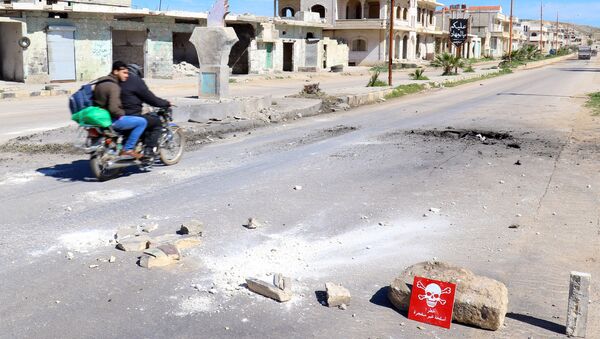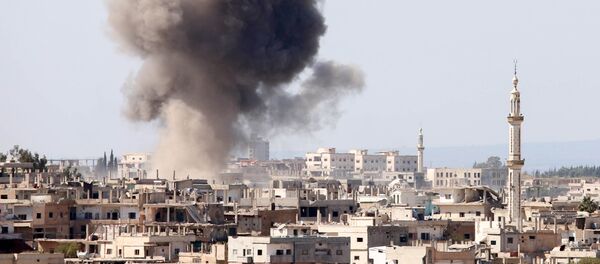MOSCOW (Sputnik) – The United Nations in a report published Wednesday accused the Syrian government of using chemical weapons in Khan Sheikhoun in April.
"Government forces continued to deliberately target civilians, including through the use of chemical weapons against civilians in opposition-held areas. As part of an aerial campaign in northern Hama and southern Idlib, on 4 April the Syrian air force used sarin in Khan Shaykhun, killing over 80 people, most of whom were women and children," the United Nations said in a statement on UN Commission of Inquiry on Syria’s report.
Our report is now online (A/HRC/36/55) and includes an inquiry into use of chemical weapons in Khan Shaykhun: https://t.co/yturJDb87t #HRC36 pic.twitter.com/P8RQJ9lEgI
— UN Syria Commission (@UNCoISyria) 6 сентября 2017 г.
On April 4, the National Coalition for Syrian Revolutionary and Opposition Forces, supported by the United States, blamed Damascus for the Khan Sheikhoun chemical weapons incident that killed 80 people, including children, and injured 200 more. The Syrian army strongly rejected the accusations and laid the blame on local militants.
#COISyria Chair Pinheiro: “Government forces used #chemicalweapons against civilians in opposition-held areas incl. #KhanShaykhun (#Idlib)”
— HRC SECRETARIAT (@UN_HRC) 6 сентября 2017 г.
Syrian civilians have been victims to a number of chemical attacks that have hit the troubled country over the past few years. At least 281 people were killed in an alleged chemical weapons attack in the Damascus suburb of Ghouta on August 21, 2013, with some reports putting the death toll at 1,729.
#COISyria: Civilians still "forcibly displaced, deliberately attacked, deprived of humanitarian aid & essential healthcare, & held hostage”
— HRC SECRETARIAT (@UN_HRC) 6 сентября 2017 г.
The UN Independent International Commission of Inquiry on the Syrian Arab Republic said in its latest report issued on Wednesday that it had registered 25 cases of chemical weapons use between March 2013 and March 2017.
"Between March 2013 and March 2017, the Commission documented 25 incidents of chemical weapons use in the Syrian Arab Republic, of which 20 were perpetrated by government forces and used primarily against civilians. During the reporting period, government forces further used chemical weapons against civilians in the town of Khan Shaykhun, in Al-Latamneh, located approximately 11 kilometers south of Khan Shaykhun, and in eastern Ghouta," the document read.
The Commission reported that it had conducted 43 interviews with eyewitnesses, victims, first responders and medical workers in an attempt to investigate the latest incident in Khan Shaykhun. The Commission also examined satellite imagery, photographs of bomb remnants, early warning reports and videos of the area allegedly affected by the air strikes, also taking into account findings of the Organisation for the Prohibition of Chemical Weapons' fact-finding mission.
The report noted that the commission's experts obtained no bomb remnants and had not been at the scene of the incident, since the Syrian government denied their entry to the country. The report said that, according to the witnesses' accounts, a Sukhoi 22 (Su-22) aircraft, which was only operated by the Syrian government forces, had been seen in the skies of Khan Shaykhun before the attack. The aircraft carried out four strikes and dropped "three conventional bombs, likely OFAB-100-120, and one chemical bomb."
"At the time of the use of chemical weapons in Khan Shaykhun and Al-Latamneh, Syrian and Russian forces were conducting an aerial campaign against Hay’at Tahrir al-Sham and armed groups in northern Hamah and southern Idlib," the report noted.
The Commission ruled out the possibility of an explosion of chemical weapon depot, suggested by the representatives of the Russian and Syrian defense ministries. According to the report, the explosion of a weapon depot would have burnt off most of the agent or forced it into the rubble, rather than released into the atmosphere. Furthermore, according to the report, the building of such depot would have been contaminated to the date, "for which there is no evidence."
The UN Commission of Inquiry on Syria also accused Syrian government forces and the Russian military of targeting hospitals and medical personnel in the war-torn country.
"Government forces continued the pattern of using chemical weapons against civilians in opposition-held areas. In the gravest incident, the Syrian air force used sarin in Khan Shaykhun, Idlib, killing dozens, the majority of whom were women and children. In Idlib, Hamah, and eastern Ghouta, Damascus, Syrian forces used weaponized chlorine. Syrian and/or Russian forces continued to target hospitals and medical personnel," the commission's report reads.
At the same time, the report noted "the absence of indications" that Russia had ever used chemical weapons in Syria.
Following a chemical weapon attack in Syria’s East Ghouta in 2013, when hundreds of people were killed, Syria joined the Convention on the Prohibition of Chemical Weapons. This was the result of an agreement between Russia and the United States on the destruction of chemical weapons in the country under the control of the Organisation for the Prohibition of Chemical Weapons (OPCW) and stopped the US military intervention in Syria. In January 2016, the OPCW announced that Syria’s entire chemical weapons arsenal had been destroyed.




